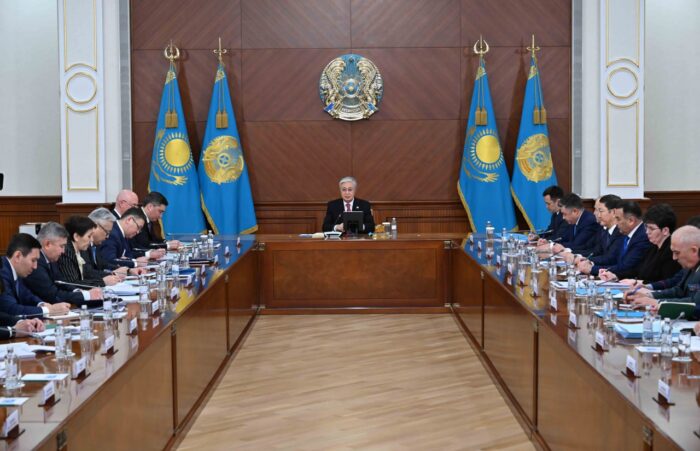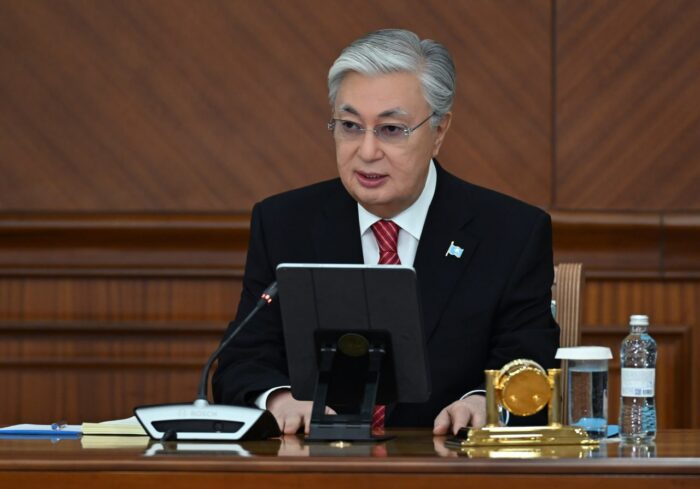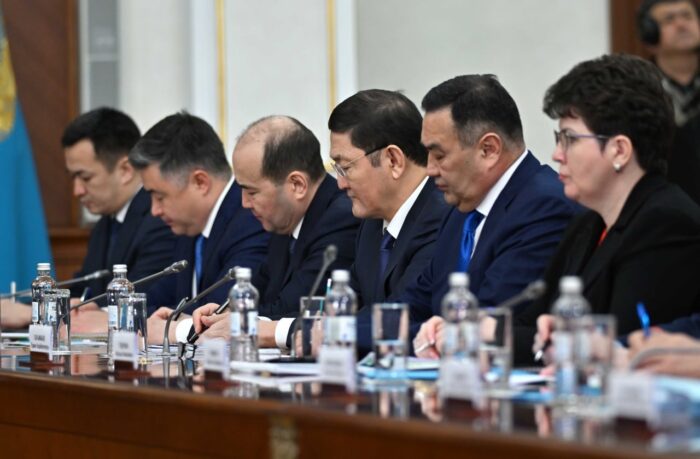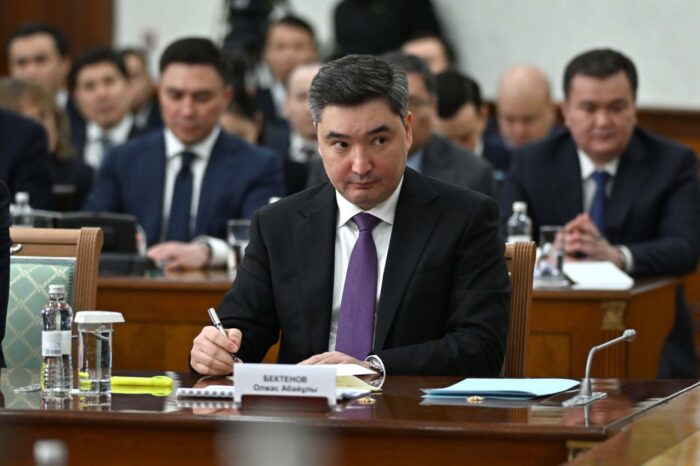ASTANA – President of Kazakhstan Kassym-Jomart Tokayev chaired the extended session of government in new composition on Feb. 7 to review the country’s social and economic development for 2023 and set main tasks for the coming period, reported Akorda press service.

An extended meeting of the Government was held today under the chairmanship of Kassym-Jomart Tokayev. Photo credit: Akorda
Opening the session, Tokayev said the country managed to maintain the positive dynamics of development in 2023 and thanked former Prime Minister Alikhan Smailov.
However, he said that there is a lot of work ahead. The government has a clear target – to increase the economy to $450 billion by 2029. To achieve this, the country’s gross domestic product (GDP) should grow at least 6% annually.
“In the economy, we need to pursue a course of consistent and dynamic liberalization. This is the only way to bring Kazakhstan to a fundamentally new level of development,” Tokayev said.
The President noted the main pillars in ensuring the social and economic development of the country.
Budget and tax policies
The first priority is to fundamentally improve the efficiency of budget and tax policies. Another systemic problem is budget distribution, which is not oriented toward stimulating economic activity. Finances are spent on current tasks, while strategic goals are not in focus.

President Tokayev. Photo credit: Akorda.
“A radical reform in tax and budget relations is needed. It should become part of a new social contract between the state and business, consolidating approaches to the fair distribution of national income. This is a priority area of the government’s work,” he said.
Investments
The second priority is to launch a new investment cycle. “One cannot but be concerned that the share of investment in fixed capital in the country’s GDP is declining. In other words, the economy is not investing enough money to maintain growth rates in the coming years,” he said.

Photo credit: Akorda.
According to Tokayev, the country needs to increase the inflow of external and internal investments significantly. This is the key task for the established Investment Headquarters.
“Investors, and especially large investors who are ready to invest, for example, more than $50 million, should be provided with a full range of support on a ‘one-stop-shop’ principle,” he said.
President Tokayev instructed the government to revise the national infrastructure plan, which should prioritize, thoroughly work out the attraction of private investment in strategically important projects, and provide financial support measures only for extreme cases.
Public procurement system, public-private partnerships and regulation of the construction industry
The third priority is to reform the public procurement system, public-private partnerships and construction industry regulation.

New Prime Minister Olzhas Bektenov. Photo credit: Akorda.
This direction should complement reforms in the field of attracting investments, as well as the effective use of budget funds.
Tokayev focused on the problems in the construction sector, including shared-equity construction, illegal and chaotic construction, and others. He tasked the government to show concrete results in this direction by the end of the year.
“One of the factors holding back the development of the construction sector, and the economy as a whole, is still corruption. I have repeatedly spoken about the need for an uncompromising fight against corruption. There have been positive developments in this area. However, we need to continue working, notably, introducing digital technologies,” he emphasized.
Liberalization of the economy
President Tokayev said the fourth priority is to take systemic measures for comprehensive liberalization of the economy. “This is an important reform that will make it possible to move away from large-scale state intervention in economic processes,” he added.
Tokayev urged the government to address uncontrolled monopolies and ensure effective privatization plans, including the IPO of national companies. He urged the government to prepare a decree on liberalization of the economy within a month.
Industrial development
The fifth priority is to boost the country’s industrial development. Large-scale and innovative projects that lay the foundation for economic growth should receive priority government support. Tokayev spoke about both the modernization of existing production facilities and the development of entirely new industrial sectors for the country.
“Another priority task is to ensure the formation of solid medium-sized businesses in the industrial sector. Road and construction equipment, equipment for the energy sector, reclamation systems, finished metal products – this is not a complete list of promising areas. If such production is not created in Kazakhstan now, then the total import of equipment will become long-term. Therefore, it is important that industrial policy is consistent with plans for modernizing infrastructure and developing the mineral resources complex,” he said.
Agro-industrial complex and efficiency of water use
The sixth priority is the development of an agro-industrial complex and rational use of water resources. The problems that hinder the development of the agro-industrial complex are well known, Tokayev said. The most acute of them is the chronic underfunding of the sector.
“Lack of investment leads to wear and tear of agricultural machinery, low yields, and low labor productivity. Therefore, it is necessary to increase, if possible, double the financing of agriculture, attracting not only budget money, but also funds from other sources, including second-tier banks,” he highlighted.
Tokayev stressed the need for rational use of water resources.
“Water-saving technologies should be widely introduced. It is necessary to implement a country-wide campaign for the introduction of water consumption culture – we use water as it is,” he said.
Communal and energy sector
The seventh priority is to accelerate the modernization of the communal and energy sector.
As a matter of priority, the government should complete the modernization of 19 heat sources in the red-risk zone this year. More than 700 megawatts (MW) of additional generation should also be commissioned.
“The postponement of deadlines is no longer acceptable,” said Tokayev.
Transport and logistics
The eighth priority is to strengthen the country’s transport and logistics potential.
“We have a strategic task to make Kazakhstan a full-fledged transport and logistics center and a transit hub of Eurasia,” he said.
Tokayev urged the adoption of a policy document aimed at solving key problems in the railway industry and completing the modernization of all roads this year.
“It is necessary to carry out total digitalization of processes, which will significantly increase the efficiency and productivity of the industry and save budget funds,” he said.
Digitalization and AI
The ninth priority is to continue the digitalization of the economy and ensure the widespread use of artificial intelligence (AI).
“We have made significant progress in digitalization of government and financial services. For example, by the end of 2023, the share of non-cash payments was 88%. Prior to 2020, this indicator did not exceed 50%,” the President said.
Tokayev urged the development of an institutional framework for AI in Kazakhstan.
“According to experts’ estimates, by 2026, more than 80% of enterprises in the world will use AI. We are already witnessing a global transformation in medicine, education, and creative industries,” he noted.
Tokayev also instructed the government to launch a Digital Nomad Residency program to attract leading foreign specialists in AI to Kazakhstan.
“We need to turn the country into a place of attraction for digital nomads from all over the world. In short, we need to keep up with the times,” he highlighted.
Social sector
The tenth priority is to strengthen the social sector. The main task of a socially oriented state is to create equal opportunities for all citizens to support people in need, stated Tokayev.
More than half of the state budget is allocated to the social sphere.
“Nearly 4.5 million people, or almost every fifth resident of the country, receive state social support. However, most of them are quite capable of working. With social assistance, we have created a psychology of dependency in society, which does not exist in developed countries. Support should be provided to people who are truly in need, and not to those living in their own homes and having expensive cars,” he said.
Tokayev underlined that the past year was successful for Kazakhstan. However, there are still many unresolved problems, so the government has to make the necessary decisions for the qualitative development of the country.
“We must work without waiting for instructions from above, complaints from citizens, or a worsening situation. You need to show initiative and independence. (…) Today, the whole world is going through a very difficult historical time in which the vector of development of states for many years ahead is determined. We must keep up with the times – quickly and decisively. Instead of wasting time on empty words, we need to take concrete actions and show political responsibility,” he noted.

